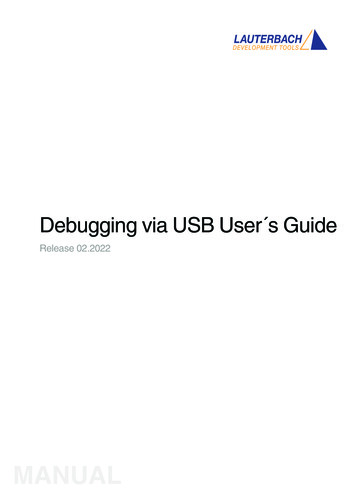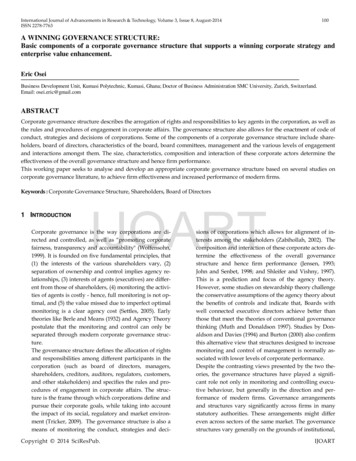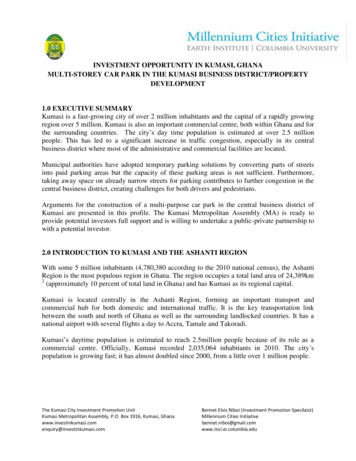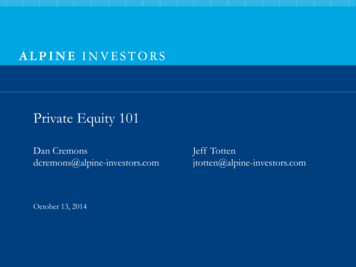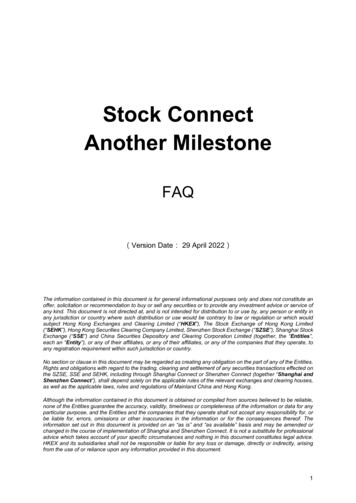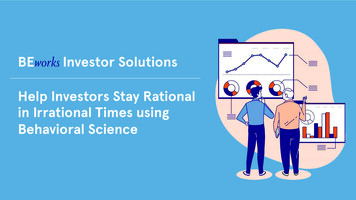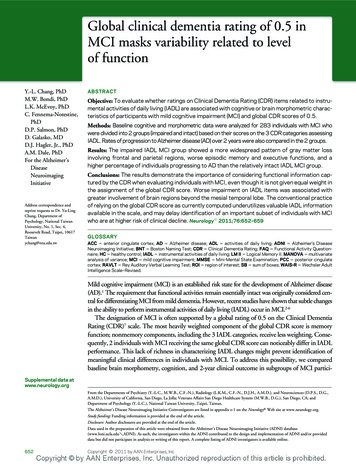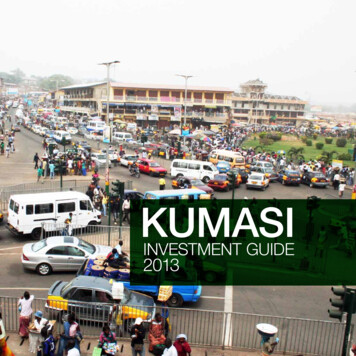
Transcription
KUMASIINVESTMENT GUIDE2013
www.investinkumasi.comKUMASI INVESTOR GUIDE3
www.investinkumasi.comDISCLAIMERThis Abbreviated Kumasi Guide has been preparedby the Millennium Cities Initiative (MCI) for the city ofKumasi, Ghana. MCI is an urban component to theMillennium Villages Project (MVP) and the nationallevel policy work of the UN Millennium Project. TheMCI’s core mission is to help a number of citiesacross Sub-Saharan Africa complete the urbantransformation essential to sustainable developmentand to attain the Millennium Development Goals(MDGs). The MCI is helping Millennium Cities bydesigning social strategies to deliver effective socialservices and economic strategies necessary tocreate jobs and stimulate domestic enterprise andincrease productivity. Kumasi is one of the elevenmillennium cities in Sub-Saharan Africa.The information contained herein is of a generalnature and is not intended to address thecircumstances of any particular individual or entity.Although we endeavour to provide accurate andtimely information, there can be no guarantee thatsuch information is accurate as of the date it isreceived or that it will continue to be accurate in thefuture.In preparing this document we have relied uponand assumed, without independent verification,the accuracy and completeness of various sources4KUMASI INVESTOR GUIDEof information, some of which have been derivedfrom public sources. Details of the sources that wehave used are given in the guide. MCI accepts noresponsibility or liability to any party in connectionwith such information or views herein.Appropriate professional advice should be soughtto undertake a more specific examination of theparticular circumstances applicable to a specificinvestment opportunity or potential investor.September 2013.
www.investinkumasi.comTABLE OF CONTENTSForewordI. Overview of GhanaGhana Fact Sheet 7A Sketch of Ghana 8Ashanti Region Fact Sheet 13II. Overview of Kumasi 14Kumasi Fact Sheet 14A Sketch of Kumasi 15III. Why Invest in Kumasi 17IV. Investment Opportunities 20V. Setting Up a Business in Kumasi23VI. Investment Incentives and Guarantees24General Incentives 24Taxation 25Locational IncentivesExemptionsIncentives under the Ghana Free Zones ProgramInvestment GuaranteesDouble Taxation AgreementsVII. Support Institutions 26Kumasi City Investment Promotion Unit (KCIPU)26Ghana Investment Promotion Centre (GIPC)27Ghana Free Zones Board 27Some Major Investors in Kumasi28Contacts 30Appendix 32References 34KUMASI INVESTOR GUIDE5
www.investinkumasi.comHIS EXCELLENCY OTUMFOUR OSEI TUTU II — ASANTEHENE(KING OF THE ASHANTI KINGDOM)01His ExcellencyOtumfour Osei TutuOn behalf of the Asanteman Council and my own behalf, I heartily welcomethis effort to make the traditional seat of the Ashanti Kingdom, Kumasi, moreknown to investors abroad and an easier place for them to do business. Boththe city and its environs need more investors to bring out their full potentialin a great variety of sectors, from agriculture to tourism. It is also importantto help investors understand the regulatory framework for doing businesshere. One key requirement for many investors is land, which in the AshantiRegion is controlled by the traditional authorities. We welcome investorsand offer the assistance of the Stool Lands Secretariat in facilitating leaseswherever we can.HONOURABLE ERIC OPOKU — ASHANTI REGIONAL MINISTER02HONOURABLEERIC OPOKUOur region is centrally located with easy access to all parts of the country,endowed with rich natural resources. It is the most populous region inGhana, making it an attractive place to do business, evidenced by therelatively large number of foreign and domestic investors operating in theregion. The Ashanti Regional Coordinating Council(ARCC) welcomes thisnew version of the guide by MCI and the ARCC is ready to assist potentialinvestors to do business in the region.HONOURABLE KOJO BONSU — MAYOR OF KUMASI036HONOURABLEKOJO BONSUKUMASI INVESTOR GUIDEThe Kumasi Metropolitan Assembly (KMA) is extremely delighted by thisupdated and abbreviated edition of the Kumasi Investors Guide and isgrateful to MCI for this initiative. The city has been very pleased with thereception that the first edition received and the role that it has played inassisting investors. This abbreviated guide provides an overview of Kumasi,shows why an investor should consider our location, outlines the basicprocedures and requirements and highlights some investment opportunities.We look forward to welcoming potential investors and pledge our supportand assistance.
www.investinkumasi.comI. OVERVIEW OF GHANAGHANA FACT SHEETOfficial name:Republic of GhanaCapital:AccraForm ofgovernment:Multi-party democracyHead ofgovernment:H.E. John Dramani MahamaLocation:West Africa, with a Gulf ofGuinea coastline of 539 kmClimate:Tropical, with temperaturesbetween 21 and 32 CPopulation:24,658,823 (2010 populationcensus)Populationgrowth rate:2%Religions:Christian 71%, Muslim 17.6%,traditional African and other11.4%Languages:English(official), Twi, Ga, Fante,Ewe, HausaCurrency:Ghana CediKUMASI INVESTOR GUIDE7
www.investinkumasi.comA SKETCH OF GHANAGhana, widely perceived as the Gateway to WestAfrica and, indeed, to Africa in general continuesto implement measures to improve its businessenvironment. The World Bank Ease of DoingBusiness 2013 Report ranks Ghana No. 1 on the “Ease of Doing Business inWest Africa” index.No. 2 on the “Ease of RegisteringProperty in Sub-Saharan Africa” index.No. 3 on the “Ease of Getting Electricityin Sub-Saharan Africa” index.No. 4 on the “Ease of Getting Credit inSub-Saharan Africa” index.No. 5 on the “Overall Ease of DoingBusiness in Sub-Saharan Africa” index.With sound macroeconomic policies, a stabledemocratic dispensation, a large pool of skilled andsemiskilled labour, strong policies in the areas ofland administration and private sector development,adequate infrastructure, a strong financial sector,strong government support for the private sector,access to a West Africa market of over 250 millionpeople through the Economic Community of WestAfrican States (ECOWAS), and relative proximity toEU and US markets, Ghana is the preferred place todo business in Africa.Ghana is divided into ten administrative regions.Each region is headed by a Regional Minister8KUMASI INVESTOR GUIDEappointed by the President. The principal unitsof local government are the district assemblies.There are three levels of governing power at thelocal government level in Ghana. These include thedistricts, municipalities and metropolises. Betweenthe district assemblies and the central governmentare the regional coordinating councils. The role ofthese bodies is to administer and coordinate policyimplementation at the local level.The country recorded a provisional GDP growth rateof 7.1 in 2012, a decrease of over 49.3% comparedto 14.4 recorded in 2011. The high GDP figurerecorded in 2011 was mostly due to the significanteconomic activity associated with the commercialproduction of oil for the first time in Ghana. In 2012the services sector was the largest, recording agrowth rate of 8.8%. The industry and agriculturalsectors recorded GDP growth rates of 7.0 and 2.6respectively in 2012.Table I.1. Ghana Economic IndicatorsEconomic Indicator20112012Inflation8.68.8Interest Rates (Based on182 days treasury bills)11.322.88Gross National Reserves(US ’million)5,474.65,348.9Source: 2013 Ghana Budget Statement by the Ministry of Finance andEconomic Planning
www.investinkumasi.comFigure I.1 Ghana GDP Growth Rate (Annual %)»*2012 growthrate is estimated(source: last visited onAugust 30, 2013)Figure I.2 Time Required to Start a BusinessFigure I.3 Import/Export Container CostFigure I.4 Stocks TradedFigure I.5 Export of Goods and ServicesKUMASI INVESTOR GUIDE9
www.investinkumasi.comFigure I.6 Linear Shipping ConnectivityFigure I.7 Strength of Legal SystemFigure I.8 New Businesses RegisteredFigure I.9 Merchandise Exports (US ’billion)»Source (for all ninegraphs above):World Bank, WorldDevelopmentIndicators, Ghana,accessed June 13,2013,http://data.worldbank.org/country/ghana#cp wdi10KUMASI INVESTOR GUIDE
www.investinkumasi.comFigure I.10 FDI Inflows-Inward (US ’Million)Figure I.11 FDI Stocks-Inward (US ’Million)Source: UNCTAD, Country Fact Sheet: Ghana 2013Ghana is a member of the Multilateral InvestmentGuarantee Agency (MIGA) of the World Bank, whichguarantees the rights of foreign investors, as well asthe International Centre for Settlement of InvestmentDisputes (ICSID), which provides a dispute resolutionmechanism. Ghana enjoys preferential access to theEU, under the Generalized Scheme of Preferences(GSP), and to the US, under the African Growth andOpportunity Act (AGOA), which covers more than6,400 items.Additionally, Ghana is a member of entities such asthe African, Caribbean and Pacific (ACP)Group of StatesWorld Trade Organization (WTO)International Chamber of Commerce(ICC)Tourism in Ghana is targeted at both domestic andinternational tourists. The coast of the country, hostssome of the most visited tourist sites in the country.The major attractions in these areas are the CapeCoast and Elmina castles, which house museums,and the Kakum National Park, which hosts one ofthe few tree canopy walks in the world. Ghana isalso host to the largest man-made lake in the worldthe Volta Lake. The northern part of the countryalso hosts interesting tourist sites such as theCocodile Pond at Paga, Wechiau Hippo Sactuaryand the Mole National Park. Famous sites in theAshanti region include the Manhyia Palace Museum,Armed Forces Military Museum, Prempeh II JubileeMuseum, Adanwomase Kente Weaving Site andBobiri Forest and Butterfly Sanctuary.KUMASI INVESTOR GUIDE11
www.investinkumasi.comFigure I.12 Ghana Tourism Map12KUMASI INVESTOR GUIDE
www.investinkumasi.comASHANTI REGION FACT SHEETAdministration:Regional Coordinating Council headed by the Regional MinisterSurface area:24,389 sq kmPopulation:4,780,380 (Ghana Statistical Service 2010)Population growthrate:2.7%Districts:30Economic activity:Agriculture (25%), General Trading and Vehicle Repair Services (21%),Manufacturing (8.6%), Accommodation and Food Services (5%),Transportation (3.4%), Construction (3%), Other (33%)With over 5 million inhabitants (4,780,380 according to the 2010 national census), the AshantiRegion is the most populous region in Ghana. The region occupies a total land area of 24,389 km2(approximately 10 percent of total land in Ghana) and has Kumasi as its regional capital.KUMASI INVESTOR GUIDE13
www.investinkumasi.comII. OVERVIEW OF KUMASIKUMASI FACT SHEETAdministration:Kumasi Metropolitan Assembly headed by the Metropolitan Chief Executive (Mayor)Location:270 km northwest of Accra, Ghana’s capitalClimate:Tropical, 21 to 34 C year-roundNotable features:Historically, the capital of the Ashanti kingdom; now the second-largest city in Ghanaand capital of the Ashanti Region, the country’s most populous regionPopulation:2,035,064 (2010 National Census)Population growth rate:5.47%Religions:Christian 79%, Muslim 16%, no religion 4%, traditional African and other 1%Languages:English and Asante TwiMain ethnic group:AshantiSource: “ADM Opens New Cocoa Processing Plant in Kumasi, Ghana,” accessedAugust 8, 2013, KUMASI INVESTOR GUIDE
www.investinkumasi.comA SKETCH OF KUMASIKumasi is located centrally in the Ashanti Region,forming an important transport and commercial hubfor both domestic and international traffic. It is thekey transportation link between the south and northof Ghana as well as the surrounding landlockedcountries. It has a national airport with several flightsa day to Accra.Kumasi’s daytime population is estimated toreach 2.5 million people because of its role as acommercial centre. Officially, Kumasi recorded2,035,064 inhabitants in 2010. The city’s populationis growing fast; it has almost doubled since 2000,from a little over 1 million people.Kumasi’s strategic geographic location makes it abrisk commercial and administrative centre, andit is often regarded as the commercial capital ofGhana, with West Africa’s largest open-area market,the Kumasi Central Market. Estimated consumerKUMASI INVESTOR GUIDE15
www.investinkumasi.comFigure II.1 Population Trend: The Ashanti Region and Kumasi, 1984 to 2015Source: KMA Statistics, 2012market reachable within one day of ground travelis approximately 12 million consumers (AshantiRegion and surrounding regions, approximately halfof Ghana’s population).Kumasi has already proved attractive to a numberof large foreign investors. Agro-processing giantArcher Daniels Midland (ADM) has been operating acocoa processing facility in Kumasi since July 2009.Other major players with an active presence includeCoca-Cola and Guinness, which both have bottlingplants in the city. Other international companies withoffices in Kumasi include Maersk, Barclays Bank,Standard Chartered Bank and Unilever, which hasbeen operating in Ghana for over 70 years.Kumasi is administered by the Kumasi MetropolitanAssembly, with the Mayor serving as the city’schief executive officer. The Ashanti Region as awhole is under the purview of the Regional Minister.The institution of chieftaincy is very pronouncedin the Ashanti Region and plays a significant rolein its management, especially in the area of landadministration. Most lands in the Ashanti Region16KUMASI INVESTOR GUIDEis administered by the Asantehene (Ashanti king)and relatively small portions belong to the stateunder the administration of the Lands Commission.The Asantehene is assisted by a variety of chiefs,including paramount, divisional and sub chiefs,and stool and clan elders, who all play roles in landacquisition, with the Asantehene playing the ultimaterole.Kumasi is home to numerous educationalinstitutions, including the largest science andtechnology university in Ghana and, indeed, in WestAfrica, the Kwame Nkrumah University of Scienceand Technology (KNUST), which has a studentpopulation of over 31,000 students, comprising bothundergraduate and postgraduate students. KNUSTalso has a business school, which enjoys a strongreputation.Through Ghana’s membership in the EconomicCommunity of West African States (ECOWAS),Kumasi potentially serves an even larger market ofover 250 million people.
www.investinkumasi.comIII. WHY INVEST IN KUMASIMarket Access — Kumasi’s location at the centreof the Ashanti Region and of Ghana, coupled withits good road network and airport, makes it thepreferred trading centre for most of the surroundingregions and an important commercial centre for WestAfrica. Kumasi has a daytime population of over 2.5million, and the Ashanti Region, the most populousregion in Ghana, is home to over 5 million people.In addition, Kumasi serves as the commercial hubfor the neighbouring Brong-Ahafo Region, the threenorthernmost regions of Ghana, and parts of theWestern and Eastern regions, creating a potentialmarket of about 12 million people.Faso, Niger and Mali, with a combined population of 48million, trade at Kumasi’s Kejetia Market, West Africa’slargest open air market — to the extent that a section ofthe market has come to be called the “French line.” Thislarge potential market is one of the many compellingreasons to investFigure III.2 Wider Ashanti/Northern and Sahelean ZoneThrough Ghana’s membership in the EconomicCommunity of West African States (ECOWAS),Kumasi potentially serves an even larger market ofover 250 million people. Merchants from landlockedcountries in the Sahel region, and especially BurkinaKUMASI INVESTOR GUIDE17
www.investinkumasi.comFigure III.3 Kwame Nkrumah University of Science and Technology StatisticsSource: KNUST Basic Statistics, 2008–2012Supportive Government Policies — A long-termmulti-party democracy, the Ghanaian governmentactively fosters a pro-business environment in thecountry. As a result of its continuing efforts, in 2013Ghana ranked number one on the World Bank’s“Ease of Doing Business in West Africa” index andnumber two in sub-Saharan Africa for the registeringproperty index. A new business can be establishedin Kumasi in 10 days.Political Stability — In addition to a longstanding,democratic national government, the city and regionbenefit from clearly defined traditional authoritieswho foster peace, unity and stability and serve ascustodians of the land. In 2003 the government,in partnership with the World Bank, launched theLand Administration Project (LAP) to develop policyand institutional reform to build a fair, efficient, costeffective land sector and to deliver land tenuresecurity. The LAP has worked with the traditionalauthorities to streamline the land acquisition processin the region.18KUMASI INVESTOR GUIDECapital — Several educational andresearch institutions provide support to investorsin the form of manpower and research. Mostnotably, the Kwame Nkrumah University of Scienceand Technology (KNUST), established in 1952,produces thousands of world class graduateseach year. Other institutions include the Universityof Education, the Kumasi Polytechnic, the ForestryResearch Institute of Ghana (FORIG), the Buildingand Road Research Institute (BRRI), the Institute ofRenewable Natural Resources (IRNR) and a numberof private universities.Human
www.investinkumasi.comAbundant Natural Resources — The wide varietyof natural resources located in Kumasi and itsenvirons present another strong incentive to investin Kumasi. Because of Kumasi’s proximity to theBonsaaso Millennium Village and its close linkagesto surrounding agricultural districts, manufacturers inthe city have ready access to a range of agriculturalproducts, including cocoa, oil palm, plantain,cassava, cocoyam, vegetables and a variety offruits. Ghana is one of the top three producersof cocoa globally, with the Ashanti Region beingthe second largest contributor to Ghana’s cocoaproduction. Located in a forest zone, the region alsohas a strong tradition of woodworking and furnituremanufacturing; timber processing is also prevalentin the region. Mineral wealth includes gold, bauxite,silica, and iron ore.Sound Financial Institutions — Many local,regional and international financial institutions serveKumasi, including Cal Bank, UT Bank, HFC Bank,Exim Guaranty Bank, Ecobank, United Bank forAfrica, Barclays Bank, Standard Chartered Bankand Stanbic Bank (member of the Standard BankGroup). These institutions offer support in the areasof export and import finance, trade finance, anddemand, fixed and savings accounts. The financialinstitutions also provide support for documentsneeded for international trade such as letters ofcredit for imports and exports, remittances andother foreign exchange transactions.Well-developed Infrastructure — With a goodroad network, a healthy telecommunicationsindustry, and adequate water and electricity supply,Kumasi has in place the infrastructure necessary toconduct business in the city. In addition, Ghana’ssecond largest airport is located in Kumasi. Fourlocal airlines run daily flights between Kumasi andAccra, the capital, and other cities in the country. Aflight from Accra to Kumasi takes about 45 minutes.The city also has numerous healthcare facilities,including the highly regarded Komfo AnokyeTeaching Hospital.KUMASI INVESTOR GUIDE19
www.investinkumasi.comIV. INVESTMENTOPPORTUNITIESwell below capacity due to a lack of raw materials.All of these factors taken together make it clear thatoil palm cultivation presents a serious opportunityfor investors.Oil Palm Cultivation: Since at least 2005, theBamboodemand for palm oil in Ghana has far outstrippedsupply. The Ministry of Food and Agriculture (MOFA)predicts that this supply gap will nearly quadruple by2014. The deficit for West Africa is expected to growat a similar, if not higher rate.At the same time, Kumasi and the Ashanti Regionoffer all of the resources necessary to fill this demand,including a favourable climate, available land withgood soil, and a ready workforce. In addition, wellestablished processors such as Ashanti Oil MillsLimited and Juabeng Oil Mills Limited are operating20KUMASI INVESTOR GUIDECultivation and Processing:TheWorld Bank-sponsored Sustainable Land andWater Management Project II in 2010 indicated adeforestation rate of 22,000 ha per year. That sameyear Ghana acording to the Food and AgriculturalOrganisation reported a gross annual deforestationrate of 135,000 ha. At this rate, the country will runout of forest cover in about 20 years. Recognizingthe potential of bamboo and the role that it canplay as an alternative to timber, the governmentof Ghana introduced in 2002 the Bamboo andRattan Development Programme (BARADEP) toidentify sustainable ways of developing the bamboo
www.investinkumasi.comsector. The Ashanti Region is believed to hold thethird largest stock of naturally growing bambooin the country. The Millennium Villages Project inBonsaaso is currently working with communities toidentify land suitable for bamboo cultivation. Thus,a concrete investment opportunity exists in thecultivation of bamboo and the production of bambooproducts in Kumasi and the Ashanti Region. At thistime, there is particular demand in the construction/real estate sector for bamboo furnishings, flooringand plywood to help fill the country’s estimated onemillion-unit housing deficit. The region is also openfor investment in products made from bamboo, suchas bamboo-frame bicycles, toothpicks, brooms,matchsticks, etc.Real Estate Development: Thanks to a flourishingand stable national economy, Ghana’s real estatesector offers sound investment opportunities. Atthis time, a severe shortage of low- to low-middleincome housing accounts for most of Ghana’sestimated shortfall of one million residential units.An annual delivery of about 150,000 units of lowerpriced housing for the next 20 years would benecessary to address this deficit and accommodatenew households. The current annual supply isbetween 30,000 and 40,000. In addition, Ghanaoffers a business environment favourable to realestate investors: capital, profits and dividends arefreely transferable; there are guarantees againstexpropriation; and double taxation agreementshave been signed with several countries. Thoughthe Kumasi Metropolitan Assembly (KMA) doesnot have a land bank, some landowners hold largetracts of land that they are willing and ready tolease to investors. In addition, the government, inpartnership with the World Bank, launched the LandAdministration Project (LAP) in 2003 to developpolicy and institutional reform to build a fair, efficient,cost-effective land sector and to deliver land tenuresecurity.Multi-storey Car Park Facility: Kumasi is a fastgrowing city of some 2 million people and the capitalof a rapidly growing region of nearly 5 million. It isalso an important commercial centre, both withinGhana and for the surrounding countries. This hasled to a significant increase in traffic in Kumasi,especially in its central business district, wheremost of the administrative and commercial facilitiesare located. Municipal authorities have adoptedtemporary parking solutions by converting partsof streets into paid parking areas but there is stillnot sufficient parking. Furthermore, this has takenspace from already narrow streets, increasingcongestion in the central business district andcreating challenges for both drivers and pedestrians.Municipal authorities are ready to provide potentialinvestors full support and are willing to establish apublic-private partnership to create a car park andsolve these problems.Tourism: The Ashanti Region and its capital, Kumasi,are endowed with a wide range of natural, culturaland historical attractions, which could provide thebasis for the promotion of a wide variety of tourismproducts. Kumasi also boasts a rich culture and animportant role in the history of Ghana. The NationalTourism Marketing Strategy identifies the keytourist sites in the Ashanti Region as the ManhyiaPalace Museum, Kumasi Zoo, Armed ForcesMilitary Museum, Prempeh II Jubilee Museum,Adanwomase Kente Weaving Site and Bobiri Forestand Butterfly Sanctuary. Numerous investmentopportunities lie in upgrading and adding value tothe existing tourist attractions, as well as developingnew attractions. Investors are taking advantage ofthe huge potential in tourism and its allied sectorsKUMASI INVESTOR GUIDE21
www.investinkumasi.comin Kumasi. Key amongst these investments is theKumasi Sun City project. When completed, theproject will comprise a multi-purpose world-classshopping mall, an entertainment park, a five-starfully equipped international clinic with an ambulancestation and a helicopter pad, a five-star hotel, and240 semi-detached executive houses within eightgated-communities, each with its own swimmingpool and tennis court.On-CampusUniversityHousingFacilitiesfor Staff and Students: The Kwame NkrumahUniversity of Science and Technology (KNUST) wasfounded in 1951 to provide higher education, withspecial reference to science and technology, and toact as a catalyst for the technological developmentof Ghana. The university, one of the largest in Africa,currently has a student population of over 31,000,up from 28,949 in 2011. The university campus issituated about eight kilometres from the CentralBusiness District of Kumasi. The campus covers anarea of about eighteen square kilometres.The university operates 6 halls of residence. Thisnumber is made up of one female hall, two male hallsand three mixed halls of residence. Out of an entirepopulation of 28,949 recorded in 2011, the universityprovided accommodation for 7,256 students (32%)made up 70% male and 30% female students. Theuniversity accommodates only 32.1% of corded a total staff of 3,698 in 2012 comprising1,010 senior members (senior lecturers, juniorlecturers and senior administrators), 992 senior staff(non-teaching support staff with first degree) and1,696 junior staff (support staff with less than firstdegree). The university provides accommodationfor 274 (27.13%) senior members, 92 (5.42%) seniorstaff and 300 (17.69%) junior staff. The rest areburdened with the task of finding accommodationthat is suitable and close to the university.NB: Full investment profiles on the investment opportunities are available on www.investinkumasi.comSource: “Fidelity Bank Opens Five Branches in Kumasi,” accessed August 8, 2013, bankopens-five-branches-in-kumasi.html22KUMASI INVESTOR GUIDE
www.investinkumasi.comV. SETTING UP A BUSINESSIN KUMASIfor export are required to register with the GFZB; allother foreign investors must register with the GIPC.Registering with either of these agencies entitles aninvestor to specific incentives and guarantees.A new business can be legally registered in Kumasiin ten (10) business days, assuming paperwork isin good order and all requirements have been met.All businesses must then register with the GhanaRevenue Authority (GRA) for tax purposes.All businesses must first register with the RegistrarGeneral’s Department (RGD). Registration withRGD will entitle an investor to Tax ideintificationnumbers, Certificate of incorporation, Certificate ofCommencement of business and the company’sregulations.Next, businesses with foreign interest are required toregister with either the Ghana Investment PromotionCentre (GIPC) or the Ghana Free Zones Board(GFZB). Foreign businesses primarily engaged inthe processing or manufacture of goods or servicesFinally, enterprises involved in activities that havea direct impact on the environment or in activitiesrelating to food and drugs are also required to registerwith the Environmental Protection Agency (EPA) andthe Food and Drugs Board (FDB) respectively.With the exception of the GFZB, which is locatedin nearby Accra, all of these agencies operate aregional office in Kumasi.For a detailed explanation on the steps required to register a business inKumasi please visit www.investinkumasi.comKUMASI INVESTOR GUIDE23
www.investinkumasi.comVI. INVESTMENT INCENTIVESAND GUARANTEESForeign and local investors may benefit from anumber of investment incentives and guaranteesthat encourage new enterprises and supportexisting ones. These include tax holidays, taxrebates and exemptions, capital allowances andbilateral investment treaties. Investors who operateunder the Ghana Free Zones Act enjoy a range ofadditional investment incentives.24KUMASI INVESTOR GUIDEGENERAL INCENTIVESSome of the general incentives include; Custom duties exemptions for plant,machinery, equipment and parts thereofGraduated and reasonable corporatetaxesAutomatic and additional immigrantquotas (work permit for employeesand residence permits for dependants)depending on the amount of paid-upcapital
www.investinkumasi.com Accelerated depreciation for plant andbuildings, five-year loss carry-over and R& D expenditure deductibilityRelief from double taxation for foreigninvestors and employees whereapplicableFull repatriation of dividends and netprofits attributed to an investmentTransfer of funds in respect of servicingof foreign loans.Guarantee against expropriationRemittance of proceeds in the sale orliquidation of investment INCENTIVES UNDER THE GHANAFREE ZONES PROGRAMThe Ghana Free Zones Act, 1995 provides thefollowing incentives for enterprises operating underthe act: 100% exemption from payment of directand indirect duties and levies on allimports for production and exports fromfree zones.100% exemption from payment ofincome tax on profits for 10 years andshall not exceed 8% thereafter.100% exemption from payment ofwithholding taxes from dividends arisingout of free zone investments.Relief from double taxation for for
The Kumasi Metropolitan Assembly (KMA) is extremely delighted by this updated and abbreviated edition of the Kumasi Investors Guide and is grateful to MCI for this initiative. The city has been very pleased with the reception that the first edition received and the role that it has played in assisting investors.
